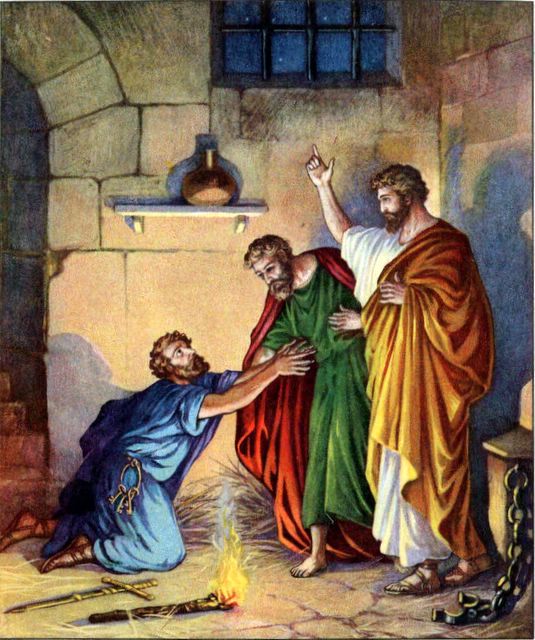
They Suffered
The apostles suffered extreme torture because of the painful position in which they were left, but they did not murmur. Instead, in the utter darkness and desolation of the dungeon, they encouraged each other by words of prayer and sang praises to God because they were found worthy to suffer shame for His sake. Their hearts were cheered by a deep and earnest love for the cause of their Redeemer. Paul thought of the persecution he had been instrumental in bringing upon the disciples of Christ, and he rejoiced that his eyes had been opened to see, and his heart to feel, the power of the glorious truths which once he despised.
With astonishment the other prisoners heard the sound of prayer and singing issuing from the inner prison. They had been accustomed to hear shrieks and moans, cursing and swearing, breaking the silence of the night; but never before had they heard words of prayer and praise ascending from that gloomy cell. Guards and prisoners marveled and asked themselves who these men could be, who, cold, hungry, and tortured, could yet rejoice.
Meanwhile the magistrates returned to their homes, congratulating themselves that by prompt and decisive measures they had quelled a tumult. But on the way they heard further particulars concerning the character and work of the men they had sentenced to scourging and imprisonment. They saw the woman who had been freed from satanic influence and were struck by the change in her countenance and demeanor. In the past she had caused the city much trouble; now she was quiet and peaceable. As they realized that in all probability they had visited upon two innocent men the rigorous penalty of the Roman law they were indignant with themselves and decided that in the morning they would command that the apostles be privately released and
escorted from the city, beyond the danger of violence from the mob.
But while men were cruel and vindictive, or criminally negligent of the solemn responsibilities devolving upon them, God had not forgotten to be gracious to His servants. All heaven was interested in the men who were suffering for Christ's sake, and angels were sent to visit the prison. At their tread the earth trembled. The heavily bolted prison doors were thrown open; the chains and fetters fell from the hands and feet of the prisoners; and a bright light flooded the prison.
The keeper of the jail had heard with amazement the prayers and songs of the imprisoned apostles. When they were led in, he had seen their swollen and bleeding wounds, and had himself caused their feet to be fastened in the stocks. He had expected to hear from them bitter groans and imprecations, but he heard instead songs of joy and praise. With these sounds in his ears the jailer had fallen into a sleep from which he was awakened by the earthquake and the shaking of the prison walls.
Starting up in alarm, he saw with dismay that all the prison doors were open, and the fear flashed upon him that the prisoners had escaped. He remembered with what explicit charge Paul and Silas had been entrusted to his care the night before, and he was certain that death would be the penalty of his apparent unfaithfulness. In the bitterness of his spirit he felt that it was better for him to die by his own hand than to submit to a disgraceful execution. Drawing his sword, he was about to kill himself, when Paul's
voice was heard in the words of cheer, "Do thyself no harm: for we are all here." Every man was in his place, restrained by the power of God exerted through one fellow prisoner.
The severity with which the jailer had treated the apostles had not aroused their resentment. Paul and Silas had the spirit of Christ, not the spirit of revenge. Their hearts, filled with the love of the Saviour, had no room for malice against their persecutors.
The jailer dropped his sword and, calling for lights, hastened into the inner dungeon. He would see what manner of men these were who repaid with kindness the cruelty with which they had been treated. Reaching the place where the apostles were, and casting himself before them, he asked their forgiveness. Then, bringing them out into the open court, he inquired, "Sirs, what must I do to be saved?"
AA 216
“The dead praise not the LORD, neither any that go down into silence.
But we will bless the LORD from this time forth and for evermore. Praise the LORD.”
Psalms 115:17, 18
“For the living know that they shall die: but the dead know not any thing, neither have they any more a reward; for the memory of them is forgotten.
Also their love, and their hatred, and their envy, is now perished; neither have they any more a portion for ever in any thing that is done under the sun.”
Ecclesiastes
9:5, 6
“They are dead, they shall not live; they are deceased, they shall not rise: therefore hast thou visited and destroyed them, and made all their memory to perish.”
Isaiah 26:14